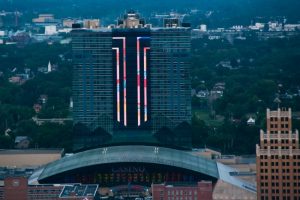 The ongoing dispute between the Seneca Nation and the state of New York over casino payments has taken a more cordial turn. The two parities preferred arbitration over litigation. University of New Mexico law professor Kevin Washburn has been named as Seneca Nation’s arbitrator, while Henry Gutman is to protect the state’s interest in the case. The two members of the arbitration panel are assigned the task to resolve the long-standing dispute between Seneca Nation and the state of New York over casino revenue sharing.
The ongoing dispute between the Seneca Nation and the state of New York over casino payments has taken a more cordial turn. The two parities preferred arbitration over litigation. University of New Mexico law professor Kevin Washburn has been named as Seneca Nation’s arbitrator, while Henry Gutman is to protect the state’s interest in the case. The two members of the arbitration panel are assigned the task to resolve the long-standing dispute between Seneca Nation and the state of New York over casino revenue sharing.
The dispute between the Seneca Nation of Indians and the state of New York headed to arbitration after the tribe gave an approving nod to Gov. Andrew Cuomo’s call for arbitration in mid-September. The official explained that the state suggested arbitration instead of litigation as it is to resolve the problem in a fast and discreet manner. According to the latest updates, the two parties have already appointed their representatives, who are to protect their interest in the case.
University of New Mexico law professor Kevin Washburn is the Senecas’ nominee. As for Mr. Washburn’s biography, he has a plenty of experience in the legal area. At present, Mr. Washburn is a law professor at the University of New Mexico. Prior to entering the academia, he spent many years as a federal prosecutor in New Mexico and general counsel of the National Indian Gaming Commission. Mr. Washburn is also a specialist in Native American civil rights as he started his legal education at UNM as a student at the American Indian Law Center’s Pre-law Summer Institute. Seneca Nation President Todd Gates commented that Mr. Washburn’s extensive knowledge in all Native gaming compacts with the government is of a vital importance for this case.
On Monday, the state of New York also announced the name of its arbitrator, appointing Henry Gutman to advocate the state’s stance on the matter. Speaking of Mr. Gutman’s career, he used to work in Simpson, Thatcher and Bartlett LLP, an international firm with American offices in New York City, Houston and Washington, D.C before his retirement. In addition to that, he served as lead counsel for some of the biggest companies such as Intel, Cisco, and others. Here it is important to note that he was the state’s arbitrator in a similar case, which took place in 2013.
What Fuelled the Dispute
 In February this year, the Seneca Nation announced that it is to stop paying a 25% cut of its slot machine revenue to the state as its compact with the state expired on 31st December 2016. The tribe did not express any interest in renewing it. The Senecas explained that the state violated the tribe’s rights designated in the compact on multiple occasions and that is the reason why the tribe did not want to renew it. But the agreement between the state and the tribe was automatically renewed as none of the parties expressed any objections to it.
In February this year, the Seneca Nation announced that it is to stop paying a 25% cut of its slot machine revenue to the state as its compact with the state expired on 31st December 2016. The tribe did not express any interest in renewing it. The Senecas explained that the state violated the tribe’s rights designated in the compact on multiple occasions and that is the reason why the tribe did not want to renew it. But the agreement between the state and the tribe was automatically renewed as none of the parties expressed any objections to it.
As a result of Senecas’ reluctance to pay tax revenue to the state, the latter issued a warning that it is to approve the construction of a non-Indian casino, which is to “eat” the profitability of the Senecas’ casinos.



















